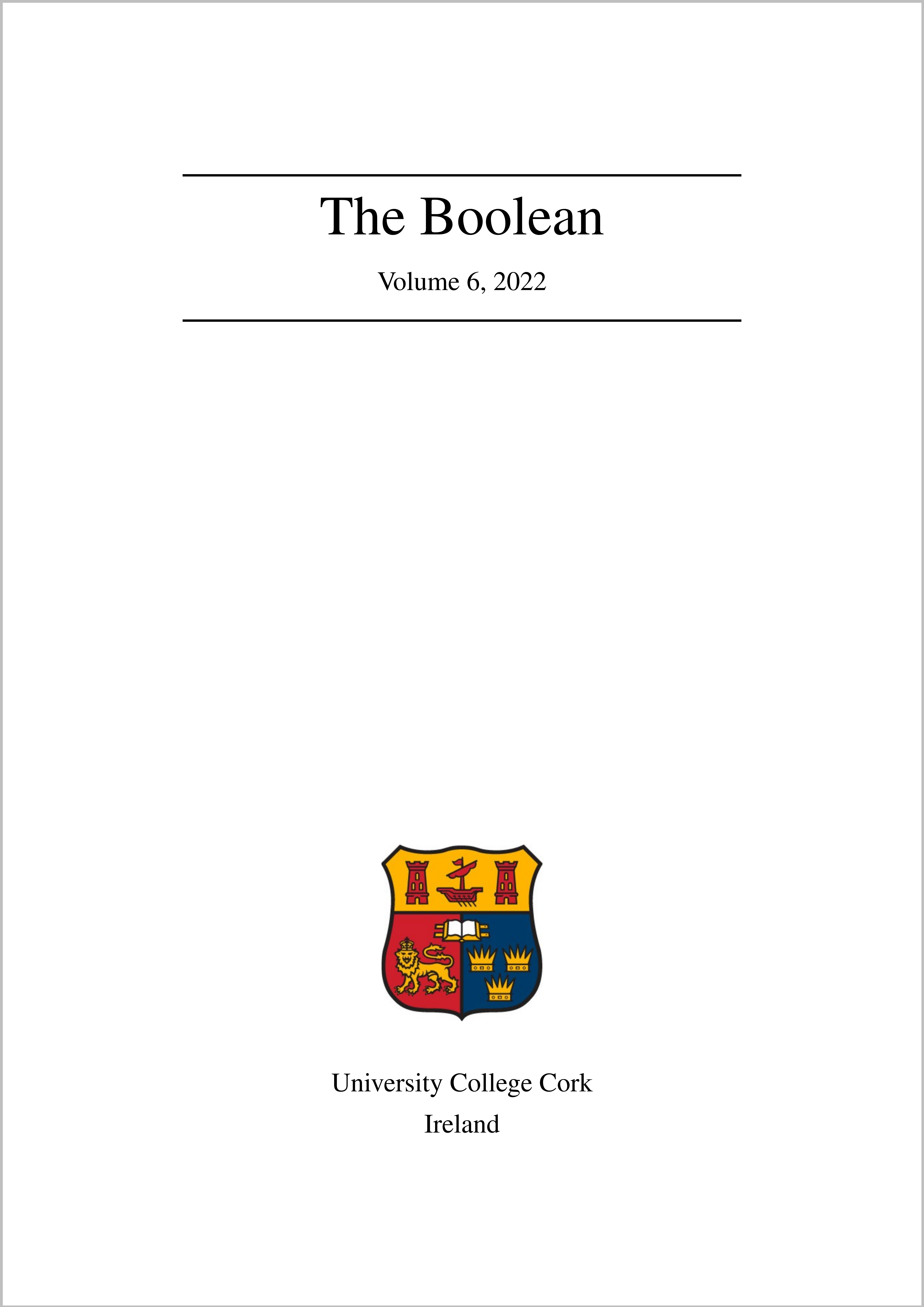On Track or Not? Why Modelling Low Carbon Policy Pathways for Passenger Transport in Ireland Matters
DOI:
https://doi.org/10.33178/boolean.2022.1.20Keywords:
transport emissions, passenger transport, modal shift, energy policy, low carbon transitionsAbstract
Passenger transport emissions are currently responsible for 10% of all greenhouse gas emissions in Ireland. Not only is the share of emissions from passenger transport significant at 10%, but also the quantity of carbon dioxide emissions from passenger transport has been growing. The majority of passenger transport emissions come from private car transport, it being responsible for 90% of all passenger transport emissions in Ireland. Past policies to reduce the net emissions from passenger transport, such as manufacturer-based European-wide emissions and efficiency standards for private cars have had limited success, with increases in activity from passenger transport and people travelling further and more often by car counterbalancing improvements in car fuel performance. In recent years, the focus has shifted from improving and electrifying cars as a means to decarbonization of passenger transport to a broader range of measures to reduce emissions from passenger transport, including reducing the need for travel in the first place and encouraging a shift to walking, cycling or modes of mass/public transportation. We discuss the global climate imperative for passenger transport decarbonization, the policy frameworks established to facilitate this, and the energy systems models we develop here in UCC to monitor current and plan future passenger transport decarbonization.
References
Government of Ireland, An Bille um Ghníomhú ar son na hAeráide agus um Fhorbairt Ísealcharbóin (Leasú), 2021 Climate Action and Low Carbon Development (Amendment) Bill 2021, (2021).
Government of Ireland, Climate Action Plan 2021, 2021.
MaREI SFI Centre for Energy Climate and Marine, CAPACITY Project, (n.d.). https://www.marei.ie/project/capacity/ (accessed May 15, 2022).
V. O’Riordan, E. Mulholland, F. Rogan, B.O. Gallachóir, H.E. Daly, Irish Car Stock Model V 2.4, (2021).
European Parliament, Council of the European Union, Regulation (EC) no. 443/2009. Off. J. Eur. Union, 140:1–15, 2009.
European Union, REGULATION (EU) No 510/2011 OF THE EUROPEAN PARLIAMENT AND OF THE COUNCIL of 11 May 2011: CO2 Efficiency. Off. J. Eur. Union, 2011.
Environmental Protection Agency. Environmental Protection Agency, Chapter 11: Environment and Transport, Ireland’s Environment - An Integrated Assessment 2020, 2020.
Environmental Protection Agency. EPA, Ireland’s Greenhouse Gas Emissions Projections 2019-2040, 2020.
J. Derham B. Wall, A. Cahalane. Ireland’s Environment - An Integrated Assessment, Environmental Protection Agency, 2020.
Olexandr Balyk, James Glynn, Vahid Aryanpur, Ankita Gaur, Jason McGuire, Andrew Smith, Xiufeng Yue, and Hannah Daly. TIM: modelling pathways to meet Ireland’s long-term energy system challenges with the TIMES-Ireland Model (v1. 0). Geoscientific Model Development, 15(12):4991–5019, 2022.
Felix Creutzig, Joyashree Roy, William F Lamb, Inês ML Azevedo, Wändi Bruine de Bruin, Holger Dalkmann, Oreane Y Edelenbosch, Frank W Geels, Arnulf Grubler, Cameron Hepburn, et al. Towards demand-side solutions for mitigating climate change. Nature Climate Change, 8(4):260-263, 2018.
Emer R Dennehy and Brian P Ó Gallachóir. Ex-post decomposition analysis of passenger car energy demand and associated CO2 emissions. Transportation Research Part D: Transport and Environment, 59:400–416, 2018.
Sustainable Mobility Department of Transport. Department of Transport, Sustainable Mobility Policy Review Background Paper4 Congestion, 2019.
Raffaella Gerboni, Daniele Grosso, Andrea Carpignano, and Bruno Dalla Chiara. Linking energy and transport models to support policy making. Energy Policy, 111:336–345, 2017.
Arnulf Grubler, Charlie Wilson, Nuno Bento, Benigna Boza-Kiss, Volker Krey, David L McCollum, Narasimha D Rao, Keywan Riahi, Joeri Rogelj, Simon De Stercke, et al. A low energy demand scenario for meeting the 1.5 C target and sustainable development goals without negative emission technologies. Nature energy, 3(6):515–527, 2018.
Tomás Mac Uidhir, Fionn Rogan, and Brian Ó Gallachóir. Develop a LEAP GHG Ireland Analytical Tool for 2050. Environmental Protection Agency: Wexford, Ireland, 2020.
Eamonn Mulholland, Fionn Rogan, and BP Ó Gallachóir. From technology pathways to policy roadmaps to enabling measures–A multi-model approach. Energy, 138:1030–1041, 2017.
Intergovernmental Panel on Climate Change. Summary for Policymakers, page 1–30. Cambridge University Press, 2015.
Vera O’Riordan, Fionn Rogan, Brian Ó Gallachóir, Tomás Mac Uidhir, and Hannah Daly. How and why we travel–mobility demand and emissions from passenger transport. Transportation Research Part D: Transport and Environment, 104:103195, 2022.
Robert C Pietzcker, Thomas Longden, Wenying Chen, Sha Fu, Elmar Kriegler, Page Kyle, and Gunnar Luderer. Long-term transport energy demand and climate policy: Alternative visions on transport decarbonization in energy-economy models. Energy, 64:95–108, 2014.
Steve Pye and Hannah Daly. Modelling sustainable urban travel in a whole systems energy model. Applied Energy, 159:97–107, 2015.
Steve Pye, Will Usher, and Neil Strachan. The uncertain but critical role of demand reduction in meeting long-term energy decarbonisation targets. Energy Policy, 73:575–586, 2014.
Fionn Rogan, Caiman J Cahill, Hannah E Daly, Denis Dineen, JP Deane, Charlie Heaps, Manuel Welsch, Mark Howells, Morgan Bazilian, and Brian P Ó Gallachóir. LEAPs and bounds—an energy demand and constraint optimised model of the Irish energy system. Energy Efficiency, 7(3):441-466, 2014.
Raffaele Salvucci, Jacopo Tattini, Maurizio Gargiulo, Antti Lehtilä, and Kenneth Karlsson. Modelling transport modal shift in TIMES models through elasticities of substitution. Applied Energy, 232:740–751, 2018.
Downloads
Published
Issue
Section
License
Copyright (c) 2022 Vera O Riordan

This work is licensed under a Creative Commons Attribution-NonCommercial-NoDerivatives 4.0 International License.



